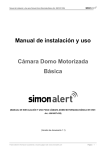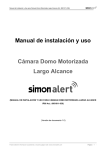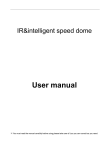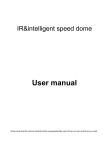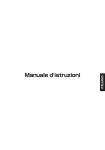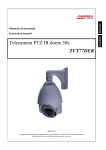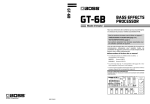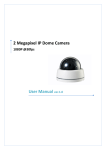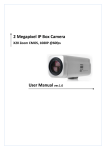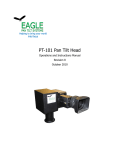Download Telecamere PTZ dome 10x TVT77DI - TVT77DE
Transcript
ENGLISH Instruction manual Telecamere PTZ dome 10x TVT77DI - TVT77DE Mi3176 Leggere attentamente questo manuale prima dell’installazione e conservare per future consultazioni Read carefully before installing and keep as future reference ITALIANO Manuale di istruzioni TVT77DI – TVT77DE 1. DATI GENERALI 1. GENERAL DATA 1.1 Avvertenze e precauzioni 1.1 Warnings and precautions ATTENZIONE - WARNING RISCHIO DI SHOCK ELETTRICO NON APRIRE! RISK OF ELECTRIC SHOCK – DO NOT OPEN! ATTENZIONE: PER RIDURRE IL RISCHIO DI SHOCK ELETTRICO, NON RIMUOVERE IL COPERCHIO. ALL’INTERNO NON CI SONO COMPONENTI RIPARABILI DALL’UTENTE. RIVOLGERSI AL PERSONALE AUTORIZZATO. WARNING: TO REDUCE THERISK OF ELECTRIC SHOCK, DO NOT REMOVE THE COVER. THERE ARE NO USER SERVICEABLE PARTS INSIDE. PLEASE CONTACT TRAINED PERSONNEL. Cambiamenti o modifiche non espressamente approvate dal costruttore possono limitare il diritto di utilizzo dell’apparato da parte dell’utente. Queste indicazioni possono essere posizionate nella parte inferiore o posteriore del prodotto e sono atte a specificare che: Changes or modification not expressly approved by the manufacturer can void the warranty of the product. The following signs can be placed on the bottom or on the rear part of the product and means that: La folgore terminante con una freccia all’interno di un triangolo equilatero indica all’utente la presenza di tensioni non isolate pericolose all’interno del prodotto stesso che potrebbero rivelarsi di intensità sufficiente a provocare uno shock elettrico per le persone. Il punto esclamativo all’interno di un triangolo equilatero sta ad indicare all’utente l’esistenza di un’istruzione riguardante una funzione o una modalità di manutenzione all’interno della documentazione che accompagna il prodotto. The lighting ended by an arrow inside a triangle means that there are dangerous voltages inside the product that could be strong enough to create electrical shock to people. The exclamation mark inside a triangle asks to the user to a specific instruction about A function or a particular maintenance mode to be checked on the user manual or documents included with the product. ATTENZIONE: PER PREVENIRE IL RISCHIO DI FOLGORAZIONE O INCENDIO, NON ESPORRE L’APPARATO ALL’ESTERNO IN CODIZIONI DI PIOGGIA O FORTE UMIDITA’. WARNING: TO PREVENT THE RISK OF ELECTRIC SHOCK OR FIRE, DO NOT EXPOSE THE APPARATUS TO RAIN OR HIGH HUMIDITY WITHOUT PROTECTION. Attenzione: l’installazione deve essere Warning: the installation must be done effettuata da personale qualificato in by trained personnel and according to accordo con quanto stabilito dalle norme local rules. nazionali. Questo prodotto è stato testato e risultato conforme per la marcatura CE. This product has been tested and complies to rules for CE marking. 2 TVT77DI – TVT77DE AVVERTENZE PER L’INSTALLATORE Si raccomanda di attenersi alle normative vigenti sulla realizzazione degli impianti elettrici e dei sistemi di sicurezza, oltre che ad ogni eventuale indicazione del costruttore o del fornitore riportate nella documentazione tecnica fornita insieme ai prodotti. Si raccomanda inoltre di provvedere ad un’accurata protezione all’ingresso di acqua o umidità all'interno della telecamera soprattutto se il contatto tra la base della staffa e la superficie di installazione non è consente un'adesione perfetta. In questi casi si raccomanda di provvedere un'adeguata stagnatura delle parti. Questo manuale va consegnato all’utilizzatore facendone prendere visione della modalità di uso e manutenzione oltre che come referenza per future consultazioni. NOTES FOR THE INSTALLER It is required to follow local rules about electrical and security systems building. Moreover it is recommended to follow all further information provided by the manufacturer or by the distributor on the technical documents included with the products. Provide a suitable protection against entering of water and humidity inside the camera. If the contact between the bracket's basement and the installation surface does not allows a perfect adherence, the camera protection could be affected. In these cases a suitable seal on both parts must be done in place. This manual must be delivered to the final user explaining the operating mode, care and maintenance requirements and must be kept for future reference. AVVERTENZE PER L’UTILIZZATORE Verificare periodicamente e scrupolosamente che la funzionalità dell’apparato sia conforme a quella prevista provvedendo al controllo delle immagini ed alla verifica della funzionalità delle parti soggette ad usura. La manutenzione periodica dell’impianto va affidata a personale specializzato in possesso dei requisiti tecnici adeguati. Contattare il proprio installatore di fiducia anche per la verifica dell’adeguatezza dell’impianto al mutare delle condizioni operative (es. aggiunta di nuove telecamere, loro nuovo posizionamento, ecc...). Questo dispositivo è stato disegnato, prodotto e collaudato con la massima cura, adottando procedure di controllo di qualità in conformità alle normative vigenti, pertanto la piena rispondenza delle caratteristiche funzionali è conseguita solo nel caso di un utilizzo limitato alla funzione per la quale esso è stato realizzato e nella rispondenza alle indicazioni di manutenzione riportate sopra. NOTES FOR THE USER It is recommended to check periodically and carefully that the functionality of the apparatus is still compliant to the requirements, providing for the pictures and the working conditions of all the parts under wear. The periodical maintenance must be done by trained personnel. Contact your installer even to check the fitness of the whole system when the surveillance needs change (i.e. new cameras adding, position changing, …). This device has been designed, manufactured and tested with the maximum care and attention, adopting all the quality procedures required by actual rules. The technical specifications and features can be satisfied only if the device is used according to the function to which it has been manufactured and according to the maintenance requirements described above. AVVERTENZE PER LO SMALTIMENTO Questo prodotto contiene componenti elettronici altamente nocivi se dispersi nell’ambiente. Si raccomanda di fare riferimento alle disposizioni comunali per il corretto smaltimento dei prodotti elettronici. NOTES FOR DISPOSAL This device includes electronic components highly dangerous for the environment. It is required to take care of it and to dispose it at the end of its life according to the local rules for environment protection. 3 TVT77DI – TVT77DE 1.2 Importanti note per la sicurezza e l’utilizzo 1.2 Important notes for safety and use Si raccomanda di leggere attentamente questo Please read carefully this manual before installing manuale interamente prima di iniziare and using the product, especially the notes and l’installazione e l’utilizzo del prodotto, in warnings in bold type. particolare le note e le indicazioni riportate in grassetto. 1. Non esporre la telecamera all'umidità. La telecamera è stata progettata per l'uso in interni (TVT77DI). Nel caso in cui la telecamera rimanga esposta all'umidità o alla pioggia, spegnerla immediatamente e richiedere l'intervento di personale specializzato. Nel caso in cui sia rimasta dell’umidità all’interno della telecamera durante l’installazione, è possibile che forti escursioni termiche ne provochino la condensa sull’ottica del modulo video. Si raccomanda di procedere con la massima cura durante la sua rimozione o contattare il servizio di assistenza tecnica autorizzato. La telecamera (TVT77DE) è dotata di guarnizioni e sistemi di chiusura stagni che garantiscono un grado di protezione IP66. Tuttavia, sarà cura dell’installatore verificare e provvedere ad un’accurata protezione all’acqua ed all’umidità in corrispondenza delle aperture per il passaggio di cavi e nella parte posteriore della staffa sia nel caso di installazione a muro che nell’istallazione con adattatori da palo o ad angolo. 2. Non installare questa telecamera sotto sopra. Questa telecamera è stata progettata per essere fissata a soffitto o a muro con appositi adattatori. Installazioni in modalità differenti (ad esempio appoggiata al suolo) possono causare malfunzionamenti. 3. Non tentare di smontare la telecamera da soli. Per evitare il rischio di scosse elettriche, non rimuovere alcuna vite o alcun coperchio dalla telecamera. All'interno non ci sono parti riparabili dall'utente. Nel caso sia necessario riparare il prodotto, richiedere l'intervento di personale specializzato. 4. Evitare di puntare la telecamera direttamente verso la luce del sole. Sia che la telecamera sia in funzione che no, si raccomanda di evitare di lasciare la telecamera verso la luce diretta del sole o verso oggetti molto luminosi, come pure puntare il sensore e/o l’ottica in verso queste fonti. Queste condizioni possono essere infatti causa di gravi danni al sensore. 4 1. Do not expose the camera to humidity This camera (TVT77DI) has been designed for indoor use. In the case of it is exposed to humidity or rain, switch it off and contact your installer immediately. If some humidity is left inside the camera during the installation, it is possible that high temperature ranges cause to condense it on the lens surface. Please use maximum care when removing this humidity or contact service personnel. The camera (TVT77DE) has sealing systems to guarantee IP66 protection degree against dust and liquids. Nevertheless, the installer must check and provide a suitable protection against water and humidity on all the cable's holes and on the rear part of the bracket's basement even when it is installed on wall or on pole / corner. 2. Do not install the camera upside down This camera has been designed to be ceiling or wall installed with suitable adapters. Different installation conditions (like on soil) can cause malfunctioning. 3. Do not attempt to dismount the camera by yourself To avoid the risk of electric shock, do not remove any screw or cover by the product. There are no user serviceable parts inside. In case it is required to repair the product please contact trained personnel. 4. Avoid to shoot direct sunlight with the camera Even the camera is on or off, avoid to leave it to direct sunlight or near extreme bright objects. Even to shoot the sun with the sensor or the lens is very dangerous and it can cause serious damage to the CCD sensor. TVT77DI – TVT77DE 5. Non impiegare solventi o detergenti forti sul prodotto. Nel caso sia necessario pulire la telecamera utilizzare semplicemente un panno soffice ed asciutto. Se risulta difficile rimuovere dello sporco, utilizzare un detergente non aggressivo ed agire gentilmente. 6. Maneggiare la telecamera con cura. Prestare particolare attenzione quando si maneggia la telecamera. Evitare urti, vibrazioni... La telecamera può risultare danneggiata nel caso in cui venga maneggiata o posizionata in modo improprio. 7. Prima dell'installazione verificare le condizioni di temperatura, umidità e alimentazione. Utilizzare la telecamera in condizioni dove la temperatura è compresa tra 0°C e +40°C e l'umidità è inferiore a 90%. La corretta tensione di alimentazione è di 12Vcc 1A. 8. Non utilizzare la telecamera nelle seguenti condizioni. Sull'ottica si può formare condensa se la telecamera è utilizzata nelle seguenti condizioni: − Elevata escursione termica a causa della repentina accensione/spegnimento di un sistema di condizionamento d'aria. − Elevata escursione termica a causa di frequenti aperture di porte/finestre con conseguenti forti correnti d'aria. − Ambienti dove i vetri si appannano. − Ambienti saturi di fumo di sigarette o polvere. Se l'ottica forma della condensa, rimuovere la cupola e asciugare tutte le superfici che presentano segni di umidità con un panno soffice. 9. Parti soggette ad usura. Parti meccaniche quali motori Pan/Tilt e motori per ottiche ed iride, ventole di raffreddamento, cinghie, contatti rotanti… sono soggette ad usura e quindi a degradarsi con l'utilizzo. Queste parti non sono coperte dalla garanzia. Questa telecamera non è idonea ad eseguire funzioni di ronda automatica in modo prolungato e continuativo, conseguentemente, al fine di limitare il più possibile il deterioramento delle parti meccaniche più sollecitate, si consiglia di attivare queste funzioni solo quando strettamente necessario. Per la sostituzione e la manutenzione di queste parti, rivolgersi a personale tecnico qualificato. 5. Do not use solvents or heavy cleaners on the product's surface. In the case it is required to clean the camera's surface, gently use a clean and soft cloth. If it is required to clean the camera's surface or dome cover, use a neutral cleaner and operate gently. 6. Handle the camera with care Take particular care when handle the camera. It is recommended to avoid impacts, vibrations... The camera can be damaged when handled without suitable care or left in a wrong position. 7. Before installing the product check the temperature, humidity and power supply conditions. Use the camera only when the environment conditions are between 0°C and +40°C and humidity below 90%. The right power supply of this camera is 12Vdc 1A. 8. Do not use the camera in the following conditions. On the lens surface can condensate humidity if the camera is used in the following conditions: − Extreme temperature range due to air conditioning power on or off. − Extreme temperature range due to frequent door or windows opening and strong air current. − Environments where windows musts up. − Environments full of smoke or dust. If the lens mists up, remove the dome cover and gently clean all the surfaces where there is humidity using a soft cloth. 9. Parts needing periodical service. Some parts like Pan/Tilt motors, motors for lens and iris, fans, belts and slip contacts are subject to wear, then it can be required to be changed during the camera's lifetime. These parts are not covered by product’s warranty. This camera is not suitable for continuous automatic surveillance patrols, then to avoid as more as possible the deterioration of the more stressed mechanical parts, it is advised to activate these functions only when strictly required. Please refer to technical service for changing the required parts. 5 TVT77DI – TVT77DE 1.3 Caratteristiche principali e specifiche 1.3 Main features and specifications Questa telecamera è dotata di un meccanismo di brandeggio che le consente la completa rotazione a 360° sul piano orizzontale e 90° sul piano verticale. Inoltre, la particolare ottica di cui è dotata consente un ingrandimento di 10 volte degli oggetti inquadrati. Il suo controllo può avvenire sia tramite consolle dedicate (tipo SK-AR11 o AT8) che tramite DVR o video server1. This camera is equipped with a PAN/TILT mechanics that allows endless 360° rotation on horizontal plane and 90° on the vertical plane. Moreover, the lens built-in the video module can magnify up to 10 times the shot objects. The camera can be easily controlled by keyboards (such as SK-AR11 or AT8) or DVR and video servers1. - Dimensioni estremamente compatte e design gradevole per una perfetta integrazione con l’ambiente di installazione. - Rotazione continua a 360° sul piano orizzontale e 90° sul piano verticale. - Controllo remoto tramite linea dati RS-485. - Supporto protocolli Pelco-P/D, baud rate 2400, 4800, 9600 bps con riconoscimento automatico. - Disponibilità di varie consolle di comando. - Zoom massimo 10x (ottico). - Funzione Day&Night con ICR meccanico e sistema di illuminazione ad IR (solo TVT77DI). - Velocità massima di rotazione massima 160°/sec (PAN). - Funzione Smart Zoom : la velocità di rotazione massima inversamente proporzionale al livello di zoom. - Funzione auto-flip: sorveglianza continua a 180° sul piano verticale. - 71 posizioni Pre-set programmabili. - 4 traiettorie (pattern) di 100 movimenti e 1 scansione cruise. - Tecnologia vector drive per il raggiungimento di posizioni il minor numero di movimenti. - Menù OSD di configurazione. - Visualizzazione a schermo del livello di zoom utilizzato. - Staffa di montaggio per installazione a muro o a soffitto. - Design extremely compact and nice shape to allow perfect integration with the surrounding environment. - Endless continuous rotation (360°) on PAN plane and 90° on TILT plane. - Remote control via RS-485 data line. - Supports Pelco P/D protocols, 2400 / 4800 / 9600 bps baud rate with automatic recognition. - Various controllers and keyboards available. - Magnification zoom (max 10x optical). - Day&Night function with mechanical ICR and IR light system (only on TVT77DI). - Maximum rotation speed 160°/sec (PAN). - Smart Zoom function: the rotation speed is in inverse proportion to the zoom value. - Auto Flip capability: allows 180° continuous surveillance to objects passing through vertical position. - Up to 71 Pre-set positions storage. - Up to 4 patterns (composed of up to 100 movements) and 1 cruise scan. - Vector Drive technology to reach the final position using the shortest path. - OSD menu. - Zoom magnification value display. - Brackets for wall or ceiling installation. 1 L'effettiva disponibilità delle funzioni qui elencate, nell'attivazione tramite dispositivi quali DVR o video server, può essere limitata a causa della non completa implementazione di tutte le funzioni previste dai protocolli di comunicazione nel dispositivo utilizzato per il controllo stesso. 1 The availability of all the functions here above described, when the camera is controlled by devices such as DVR or video servers, can be limited due to a not complete implementation of all the protocol's functions into the device used to control the camera. 6 TVT77DI – TVT77DE 2. INSTALLAZIONE 2. INSTALLATION 2.1 Collegamenti 2.1 Connection Si raccomanda di verificare lo stato dell’imballo prima di aprire lo stesso e di verificare la presenza di tutti gli accessori prima di iniziare l’installazione: − Telecamera PTZ − Staffa per fissaggio a muro − Base staffa − Alimentatore Il disegno seguente mostra le connessioni da effettuare sulla telecamera: Please check the packaging condition before opening it, and check that all the items here below described are included before begin the installation: − PTZ camera − Wall bracket − Bracket basement − Power adaptor The following diagram shows the connections to be made at the camera’s cables. Note: - Si raccomanda di prestare attenzione a non collegare erroneamente la linea di alimentazione alla linea dati RS-485 per non danneggiare irreparabilmente la telecamera. - Per la trasmissione del segnale video è necessario impiegare un cavo coassiale a 75 ohm da collegare ad un monitor o DVR per la visualizzazione / registrazione. - Al fine di evitare disturbi al segnale video o difficoltà di controllo della telecamera si raccomanda di provvedere canalizzazioni distanziate tra i cavi di segnale video e RS-485 da eventuali sorgenti di disturbi elettromagnetici o cavi di potenza. Viceversa, la distanza massima di comunicazione tra controller e telecamera potrebbe essere ridotta. Notes: - It is strongly recommended to be aware to do not connect wrongly the power supply cables to the RS-485 line to avoid camera’s malfunction. - For video signal it is required to use a 75 ohm coaxial cable to be connected to the system monitor or DVR to display and/or record the pictures. - To avoid noises to video signal or difficulties in camera’s control it is strongly recommended to run the camera’s cables far from high power mains lines or electromagnetic noise’s sources. Otherwise, it could be required to reduce the maximum distance allowed between camera and controller. 7 TVT77DI – TVT77DE 2.2 Distanze massime e terminazione 2.2 Maximum distances and termination In conformità allo standard RS-485, il numero massimo di dispositivi collegabili ala linea dati non deve essere superiore alle 32 unità (incluso il dispositivo di controllo). Inoltre, al fine di garantire la corretta trasmissione dei dati per tutta la lunghezza della linea, si deve provvedere alla corretta terminazione della linea con impedenza caratteristica di 120 ohm. Il cablaggio della linea dati può essere effettuato con cavo twistato AWG24. Si raccomanda di configurare la velocità di trasmissione sulla linea (baud rate) in funzione della distanza tra il controller e la telecamera più lontana. Indicativamente, questa tabella può essere tenuta in considerazione per la corretta selezione della velocità di trasmissione: According to RS-485 standard, the maximum number of devices to be connected to the same data line should not be higher than 32 (including the controller device). Moreover, in order to guarantee the correct data’s transmission, all line over, it is required to provide the correct line’s termination using the standard impedance of 120 ohm. The RS-485 line can be run with AWG24 twisted cable. It is required to set the data transmission speed (baud rate) according to the maximum distance between the camera and the controller device. The following table can give a rough idea about the transmission speed selection considering the distances between devices. Baud rate Distanza massima Maximum distance 2400 bps 1200m 4800 bps 800m 9600 bps 600m In funzione della topologia dell'impianto e delle distanze relative tra i vari dispositivi collegati, può essere richiesto di adattare l'impedenza della linea con resistori da 120 ohm (non inclusi). Gli schemi seguenti mostrano una serie di modalità di cablaggio differenti nelle quali ciascun dispositivo può rappresentare una telecamera o un controller. According to system’s topology and devices’ relative distances, it can be necessary to adapt line’s impedance using 120 ohm resistors (not included). The following diagrams show different installation situations and possible cabling ways: each device showed in these diagrams can be a camera or a controller. 2.2.1 Cablaggio a cascata 2.2.1 Daisy chain La modalità di cablaggio più corretta per la linea The most correct way to run a RS-458 line is RS-485 è quella mostrata nella figura seguente: showed in the following picture: Come evidenziato nella figura è necessario che il As shown on the picture, it is required to put the dispositivo più lontano collegato alla linea 120 ohm termination resistor on the farthest device 8 TVT77DI – TVT77DE presenti una chiusura di terminazione di 120ohm. connected. 2.2.2 Cablaggio a bus Dato che in alcune condizioni installative non è possibile effettuare il cablaggio della linea RS485 come mostrato sopra, uno schema equivalente di cablaggio è quello mostrato in questa figura: 2.2.2 Bus cabling Since in some installing condition it is not possible to run the cables as described above, the following picture shows an equivalent diagram: In questo caso la linea RS-485 è cablata come un bus e ciascuna telecamera viene collegata ad essa tramite una tratta di cavo derivata in parallelo. Esiste comunque una limitazione sulla lunghezza massima delle tratte “D” che non devono eccedere i 7 metri. In questo caso è necessario che la terminazione di chiusura da 120ohm sia posta sia sul primo dispositivo che sull'ultimo. In this case the RS-485 line is cabled like a bus and every camera is connected to the bus via a stretch line connected in paralel. There is a limitation on the maximum length of “D” sections that should not be longer than 7 meters. In this case it is required that the 120 ohm termination resistor is put on the first and on the last devices. 2.2.3 Cablaggio a stella In alcune situazioni installative è possibile che la disposizione delle telecamere dell'impianto non permetta di effettuare il cablaggio a bus, ma è necessario realizzare un cablaggio a stella. Questa configurazione, seppur in contrasto con le specifiche richieste dallo standard RS-485, può ancora essere realizzata tenendo conto però che potrebbero verificarsi difficoltà di controllo di alcune telecamere (ad esempio è possibile che queste non rispondano all'invio di comandi, o che si muovano solo ad intervalli, oppure ancora che dopo aver iniziato a ruotare non ricevano il comando di stop). In questo casi si raccomanda comunque di provvedere alla terminazione della linea seguendo i criteri descritti per i casi precedenti. Lo schema seguente descrive questa situazione: 2.2.3 Star connection In some installation situations it is possible that the cameras’ positions don’t allow to make a bus connection, while a star connection can be made. This configuration, even if in contrast with RS-485 standard specification, can be made as well. However it must be kept in consideration that controlling difficulties can occur (i.e. it is possible that some cameras do not act to commands, or move only temporarily, or keep moving even after stop command is sent). In these cases it is required to provide a suitable line’s termination following the criteria described on above cases. The following diagram describes the situation: 9 TVT77DI – TVT77DE Come si nota, in questo caso le resistenze di terminazione sono state introdotte sia sul dispositivo più vicino al centro della stella che su quello più lontano. In casi particolari potrebbe essere necessaria l'introduzione di un distributore di segnale da posizionare al centro della stella: questo dispositivo fa in modo che ciascuna linea sia correttamente collegata al resto dell'impianto e, per quanto riguarda la terminazione dei dispositivi si possa fare riferimento alle tipologie installative a bus descritte nei paragrafi precedenti. Lo stesso dispositivo può essere utile anche nel caso di impianti con più di 31 telecamere. Si raccomanda di rispettare queste specifiche al fine di garantire il corretto funzionamento dei dispositivi collegati alla linea dati. As showed, in this case the resistors are put on devices farthest and nearest to the star centre. In some particular conditions it could be necessary to use a signal distributor on the star centre: this device allows that every line is rightly connected to the rest of the system and, regarding the device’s termination, the daisy chain or bus cabling types described on the previous paragraphs can be applied again. The same signal distributor can be used also on systems where it is required to install more than 31 cameras. It is strongly recommended to respect these specifications to guarantee the right camera’s and device’s working conditions. 2.3 Selezione Protocollo e Baudrate 2.3 Protocol and baudrate selection Queste telecamere sono compatibili con i protocolli Pelco P e Pelco D. I valori di baud rate supportati sono: 2400, 4800, 9600 bps. La telecamera rileva automaticamente il protocollo ed il baud rate di trasmissione utilizzati dalla consolle o dal DVR durante il suo funzionamento, di conseguenza non è necessaria alcuna programmazione di questi parametri di comunicazione. These cameras are compatible with Pelco D and Pelco P protocols. The supported baud rates are: 2400, 4800, 9600 bps. The camera detects automatically the communication protocol and baud rate used by the DVR or controller keyboard during its working. Then it is not required to set any of these communication parameters during the installation. 10 TVT77DI – TVT77DE 2.4 Selezione indirizzo 2.4 Address selection Nel caso di utilizzo di più telecamere sulla stessa linea dati è necessario assegnare un indirizzo univoco a ciascuna di esse (ID) per poterle comandare in modo indipendente dalle altre. Esistono due modi per assegnare l'indirizzo alla telecamera: il primo via hardware, il secondo tramite il menù OSD di configurazione della telecamera (soft). Sempre tramite il menù OSD è possibile stabilire quale delle due modalità sarà quella effettivamente utilizzata (come spiegato nella sezione 4.2). Nel circuito di controllo presente all'interno della telecamera sono presenti alcuni dip-switches che consentono di selezionare l'indirizzo (hardware) della telecamera. In the case of many cameras are connected at the same RS-485 line, it is required to assign an unique address (ID) to each of them, in this way it will be possible to control each camera independently from the others. There are two ways to assign the address to the cameras: the first one via hardware (dip-switches), the second using the OSD menu (soft). Using the OSD menu it is even possible to select which mode will be active (as explained on section 4.2). On the control PCB inside the camera there are some dip-switches that allow to select the hardware address for the camera. Gli switch per la selezione dell’indirizzo mostrati nella figura sopra permettono di configurare fino a 255 unità. La tabella seguente può essere un utile riferimento per la selezione dell’indirizzo della telecamera (vengono riportati solo gli indirizzi da 1 a 64 come esempio). The address switches, shown on the picture above, allow to set up to 255 units / addresses. The following table can be a useful reference to select the camera’s address (here there are address from 1 to 64, the rest is omitted). 11 TVT77DI – TVT77DE 12 TVT77DI – TVT77DE 3. Funzionamento 3. Operating mode A causa della differente modalità di integrazione dei protocolli di comunicazione in telecamere e dispositivi di controllo quali consolle e DVR, è possibile che non tutte le funzioni sopportate dalla telecamera siano effettivamente attivabili. Nella descrizione che segue si fa riferimento alla consolle AT8, per le stesse ragioni spiegate sopra è possibile che, utilizzando altre combinazioni di dispositivi, la modalità di funzionamento o attivazione di alcune funzioni sia differente. Due to different communication protocol's integrating ways between different cameras and control devices such as DVR or keyboards, it can be possible that some of the functions described here below are not usable. On the following description AT8 keyboard will be taken as reference, due to the reasons described above it is possible that using different device’s combination, the working way of some functions are different. 3.1. Inizializzazione 3.1 Set - up All'accensione della telecamera questa effettuerà una rotazione di inizializzazione automatica durante la quale verranno eseguiti movimenti in orizzontale ed in verticale. Al termine di questa fase sarà possibile muovere liberamente la telecamera utilizzando il joystick. La telecamera si muoverà coerentemente ai movimenti operati attraverso il joystick (destra/sinistra, alto/basso). Per azionare lo zoom è possibile ruotare il joystick sul proprio asse: la rotazione in senso orario provocherà un ingrandimento dell'area inquadrata (zoom in), la rotazione in senso antiorario provocherà un allargamento dell'area inquadrata (zoom out). As the camera power is on, it will perform the boot sequence during which it will run on horizontal and vertical movements. At the end of this sequence it will be possible to control the camera using the joystick. The camera will move according to the joystick movements (right/left, up/down). To activate the optical zoom it is possible to rotate the joystick on its own axis: the clockwise rotation will operate the magnification of the shot area (zoom in), while the counter clockwise rotation will operate the zoom out. 3.2 Memorizzazione Pre-set 3.2 Pre-set storing Per memorizzare una posizione Pre-set (definita da tutte le coordinate PAN, TILT e ZOOM), e poterla richiamare successivamente in modo manuale o automatico, muovere dapprima la telecamera utilizzando il joystick fino ad ottenere l’inquadratura desiderata, successivamente premere i tasti nella sequenza mostrata sotto: To store a Pre-set position (according to all PAN, TILT and ZOOM coordinates), and to call it manually or automatically, move firstly the camera up to the desired position and then press the button sequence on the keyboard as here below: [SET] + n° [1-255] + [PRE] [SET] + n° [1-255] + [PRE] 3.3 Richiamo Pre-set 3.3 Pre-set call E' possibile richiamare istantaneamente ciascuna It is possible to call each Pre-set position stored delle posizioni memorizzate precedentemente con before using the following button sequence: la seguente combinazione di tasti: n° [1-255] + [PRE] n° [1-255] + [PRE] 13 TVT77DI – TVT77DE 3.4 Funzione Scan 3.4 Scan function Attivando la funzione SCAN, la telecamera effettuerà la rotazione completa a 360° sul piano orizzontale. L'esecuzione della funzione SCAN prevede delle brevi soste circa ad ogni 110° durante la rotazione. Per attivare la funzione SCAN operare come segue: With the SCAN function the camera will perform a complete endless 360° rotation. During the SCAN function the camera will randomly for a while. To activate the SCAN function press the following buttons: [SET] + [1] + SCAN [SET] + [1] + SCAN 3.5 Funzione Pattern 3.5 Pattern function La funzione PATTERN permette di memorizzare un percorso definito dall'utente, per eseguirlo in modo identico continuativamente. Questa telecamera permette di memorizzare fino a 4 percorsi PATTERN costituiti ciascuno da un massimo di 100 movimenti nelle coordinate PAN, TILT e ZOOM. Per attivare l'esecuzione di una delle funzioni PATTERN è necessario utilizzare questa combinazione di tasti: The PATTERN function allows to record an arbitrary path according to the user’s surveillance needs and to repeat it continuously. The camera allows to store up to 4 paths and each path can be made of up to 100 movements on PAN, TILT and ZOOM coordinates. To activate one of the recorded PATTERN it is required to use the following button combination: [1-4] + [PAT] [1-4] + [PAT] La memorizzazione dei PATTERN avviene tramite To set the PATTERN sequence use the OSD option menù OSD come spiegato nella sezione 4.4. as described on section 4.4. 4. Menù OSD 4. OSD Menu Questa telecamera è dotata di un menù OSD di configurazione che permette di regolare i parametri video di ripresa, ma anche di attivare / disattivare alcune funzioni particolari. All'accensione della telecamera, e durante la fase di inizializzazione, verranno mostrate a schermo alcune informazioni quali: This camera has a configuration OSD menu that allows to set up all the video parameters and to activate or de-activate some particular functions. When the camera is turn on, and during the booth sequence, some information will be displayed on the screen, such as: PTOL: AUTO COMM: AUTO ADDR: 1 In particolare, al fine di attivare la visualizzazione del menù OSD, prestare attenzione a che l'indirizzo visualizzato dal display della tastiera sia quello relativo alla telecamera desiderata. Per attivare la visualizzazione del menù OSD è necessario che la telecamera sia in modalità di funzionamento manuale e che cioè non siano in esecuzione alcuna delle funzioni di ronda 14 PTOL: AUTO COMM: AUTO ADDR: 1 In particular, in order to activate this OSD menu display, pay attention that the address displayed on the keyboard LCD display is the same of that one assigned to the camera to be controlled. To activate the OSD menu's display, the camera must be on manual control mode, and also no any automatic patrol function are in execution. However, it is always possible to move the joystick to come back to manual control. TVT77DI – TVT77DE automatica. Altrimenti, per passare alla modalità di To display the OSD menu press the following controllo manuale, è sufficiente muovere il joystick buttons: in qualunque direzione. Per attivare il menù OSD premere i seguenti tasti: [95] + [PRE] [95] + [PRE] MAIN MENU → SYSTEM INFORMATION ADRESS SETTING MOTION PATTERNS CAMERA CRUISE SETTING DISPLAY SETTING IR SETTING RESTORE FACTORY DEFAULT REBOOT SYSTEM EXIT Muovere il joystick nelle 4 direzioni per spostare il cursore all'interno del menù OSD: il movimento del joystick verso destra ha valore di selezione di un'opzione o permette di accedere ad un eventuale sotto menù. Lo stesso effetto lo si ottiene premendo il tasto OPEN. Una volta selezionata un'opzione è possibile scorrere i valori assegnabili al parametro muovendo il joystick verso l'alto o verso il basso. Tramite il tasto CLOSE è possibile uscire completamente dal menù. Move the joystick on the 4 directions to navigate into the OSD menu: when the joystick is moved to right it will have the same effect of selecting an option or to go to the following menu page. The same effect can be reached even pressing the OPEN button. Once an option is selected, it is possible to change its value moving the joystick up or down. Using the CLOSE button it is possible to exit the menu. 4.1 Informazioni di sistema 4.1 System information L'opzione SYSTEM INFORMATION consente di accedere alla finestra che visualizza le informazioni tecniche relative alla telecamera (alcuni di questi valori non possono essere modificati dall'utente): The SYSTEM INFORMATION option allows to display the window with technical information about the camera (some of these parameters cannot be changed by the user): SYSTEM INFORMATION → COM 9600, N, 8, 1 ADDRESS 1 SOFTWARE VERSION V5.2 BACK EXIT 15 TVT77DI – TVT77DE − − − − − COM: visualizza i dettagli di comunicazione correntemente utilizzati dalla telecamera (baudrate, parità, bit dati e stop bit): ADDRESS: visualizza l'indirizzo correntemente assegnato alla telecamera (0255). SOFTWARE VERSION: versione del software interno della telecamera. BACK: torna al menù precedente. EXIT: esce completamente dal menù. 4.2 Selezione indirizzo − − − − − COM: displays the communication parameters currently set on the camera (baudrate, parity, data bits and stop bit). ADDRESS: displays the address currently set to the camera (0-255). SOFTWARE VERSION: displays the camera's software version. BACK: turns to previous menu page. EXIT: closes the OSD menu. 4.2 Address selection Il menù di selezione dell'indirizzo viene mostrato The address selection menu is shown in the picture nella figura qui sotto: here below: ADDR SETTING → ADDR TYPE ADDR SOFT ADDR HARD BACK EXIT − ADDR TYPE: questa opzione consente di selezionare la modalità di assegnazione dell'indirizzo HARD o SOFT. Con la modalità HARD l'indirizzo viene assegnato tramite i dipswitches presenti all'interno della telecamera (come mostrato nelle figure della sezione 2.4). Impostando la questa voce sulla modalità SOFT invece, l'assegnazione dell'indirizzo tramite dip-switches verrà ignorata e l'indirizzo della telecamera potrà essere specificato tramite l'opzione seguente2. − ADDR SOFT: consente di specificare l'indirizzo da assegnare alla telecamera nel caso di modalità di funzionamento “SOFT”. − ADDR HARD: (voce non modificabile da menù) visualizza l'indirizzo correntemente assegnato alla telecamera tramite i dipswitches. − 4.3 Motion 4.3 Motion HARD 255 1 ADDR TYPE: this option allows to set the address selection mode between HARD or SOFT. Using the HARD mode, the camera's address will be assigned using the dip-switches inside the camera body (as shown on section 2.4). While selecting the SOFT mode on this option, the dip-switches positions will be ignored and the camera's address assignment can be made using the next option2. − ADDR SOFT: this option allows to specify the camera's address when the SOFT mode is selected. − Use the joystick to change the value of the camera's address. − ADDR HARD: (not changeable via OSD menu) this option just shows the hardware address currently assigned to the camera by its dip-switches. La finestra Motion contiene alcune opzioni di The Motion window contains some programming programmazione relative all'esecuzione di funzioni options relatively to automatic patrol functions di ronda automatiche in caso di perdita di execution in the cases of power loss or after a 2 2 Si raccomanda di riavviare la telecamera dopo aver modificato l'opzione da HARD a SOFT o viceversa. It is required to re-boot the camera after HARD/SOFT option is changed. 16 TVT77DI – TVT77DE alimentazione o dopo un determinato periodo di certain period of no activity (Park Action). inattività. MOTION → FRAME SCAN POWER UP PARK TIME PARK ACTION BACK EXIT NONE 15s NONE − FRAME SCAN: opzione che consente di − FRAME SCAN: this option allows to enter the sub-menu devoted to program the Frame Scan accedere al sotto-menù per la programmazione function. This function allows to execute an della funzione Frame Scan. Questa funzione automatic scan (only on PAN coordinate) permette di effettuare la scansione automatica (solo nella coordinata PAN) tra due posizioni between two positions to be set using the next predefinite tramite il sotto-menù seguente: menu page: FRAME SCAN → SET SCAN POSITION CLEAR FRAME SCAN FRAME SCAN SPEED BACK EXIT Per stabilire il limite destro e sinistro della funzione Frame Scan, selezionare l'opzione “Set Scan Position”, successivamente posizionare la telecamera in corrispondenza del primo punto e premere il tasto OPEN, posizionare poi la telecamera in corrispondenza del secondo punto e premere nuovamente il tasto OPEN. SET FRAME SCAN LEFT LIMIT POSITION IRIS OPEN TO CONTINUE 16 To set the left and right Frame Scan limits, select the “Set Scan Position” option, move the camera up to the first desired position (left) and then press OPEN button on the keyboard. Move the camera to the second point and then press again the OPEN button to set the second position (right). SET FRAME SCAN RIGHT LIMIT POSITION IRIS OPEN TO CONTINUE − CLEAR FRAME SCAN: tramite questa − CLEAR FRAME SCAN: selecting this option opzione verranno cancellate entrambe le both left and right positions (Frame Scan limits) posizioni (limite destro e sinistro) della will be erased. funzione Frame Scan. − FRAME SCAN SPEED: this option alows to set the execution speed of Frame Scan function: − FRAME SCAN SPEED: velocità di esecuzione della funzione Frame Scan: 1-32 (valori più alti 1-32 (higher values mean higher speed). indicano velocità maggiore). The Frame Scan function can be activated only 17 TVT77DI – TVT77DE using the function “Power up” or “Park Action” La funzione Frame Scan può essere attivata described below. solo tramite le funzioni “Power up” e “Park Action” descritte di seguito. − POWER UP: this option allows to set which function must run automatically as soon as the − POWER UP: questa voce consente di camera is powered on and in the case of no any specificare la funzione da eseguire dopo other command is received. This option can be l'accensione della telecamera nel caso in cui set to the following values: non venga ricevuto alcun altro comando dalla NONE: the camera will remain at the starting tastiera. Questa voce consente di attivare position. automaticamente queste funzioni: AUTO SCAN: continuous 360° endless NONE: nessuna funzione rotation (without stops). AUTO SCAN: rotazione continua a 360° RANDOM SCAN: continuous 360° endless (senza soste) rotation (with stops randomly). RANDOM SCAN: rotazione continua a 360° FRAME SCAN: the Frame Scan function, (con soste in punti casuali) described above, will be called automatically. FRAME SCAN: funzione Frame Scan descritta PRESET 1: the Pre-set 1 position will be called. sopra PRESET 8: the Pre-set 8 position will be called. PRESET 1: richiama la posizione Pre-set 1 PATTERN 1: the PATTERN 1 function will be PRESET 8: richiama la posizione Pre-set 8 executed automatically. PATTERN 1: richiama il percorso Pattern 1 PATTERN 2: the PATTERN 2 function will be PATTERN 2: richiama il percorso Pattern 2 executed automatically. PATTERN 3: richiama il percorso Pattern 3 PATTERN 3: the PATTERN 3 function will be PATTERN 4: richiama il percorso Pattern 4 executed automatically. CRUISE: scansione delle posizioni Pre-set PATTERN 4: the PATTERN 4 function will be memorizzate (da 1 a 20) executed automatically. − SET PARKING TIME: consente di CRUISE: it will scan automatically the stored specificare il tempo di inattività dopo il quale Pre-set positions (from 1 to 20). attivare la funzione “PARK ACTION” (15- − 250sec.). − PARK ACTION: funzione da attivare dopo il tempo di inattività specificato sopra. Possono essere eseguite le stesse funzioni descritte per la funzione POWER UP, con l'aggiunta della funzione REPEAT LAST che richiama la funzione attiva prima del passaggio al controllo manuale. − SET PARKING TIME: allows to specify the time after which the camera will run the “PARK ACTION” (15-250sec.), in the case no other command is received from the controller. PARK ACTION: specify the function to run once the parking time is ended. The same functions listed on POWER UP option can be set also in this case. Moreover POWER UP function allows here there is one more option: REPEAT LAST. This option will call the function that were under execution before taking the manual control. 4.4 Patterns 4.4 Patterns La funzione Pattern consente di memorizzare un percorso di ronda arbitrario definito dall'utente per poi poterlo eseguire nuovamente in modo automatico. Questo percorso può essere costituito da un massimo di 100 movimenti. The Pattern function allows to store an arbitrary path by the user and to repeat it automatically. This path can be made of up to 100 movements. This camera can store up to 4 different patterns. 18 TVT77DI – TVT77DE PATTERNS → PATTERN NUMBER 1 PROGRAM PATTERN CLEAR CURRENT PATTERN CLEAR ALL PATTERNS BACK EXIT − PATTERN NUMBER: selezione del percorso − PATTERN NUMBER: it allows to select the da memorizzare o cancellare (1-4). Pattern to be set or erased (1-4). − PROGRAM PATTERN: consente di accedere − PROGRAM PATTERN: it allows to enter the alla finestra per la programmazione del pattern's programming window. percorso. PROGRAM PATTERN MOVE THE CAMERA TO THE STARTING POSITION “IRIS OPEN” TO CONTINUE Per iniziare a programmare il percorso spostare la telecamera tramite il joystick al punto di partenza e premere il tasto OPEN sulla tastiera. La finestra mostrata a schermo cambierà nella seguente: To start programming a Pattern use the joystick to move the camera up to the starting point and press OPEN button on the keyboard. The following window will be displayed on the monitor. STORAGE USED <PCT> 1% A questo punto sarà possibile muovere il joystick seguendo il percorso desiderato, ad ogni movimento del joystick la percentuale verrà incrementata ad indicare l'occupazione della memoria per questa funzione. Quando verrà raggiunta la percentuale 100% la telecamera tornerà automaticamente al menù precedente. Nel caso in cui si voglia fermare la memorizzazione del percorso prima del raggiungimento della quota 100% è possibile premere nuovamente il tasto OPEN. Per eseguire la funzione PATTERN sarà sufficiente uscire dal menù e premere i tasti: Then move the joystick to all required directions so that the camera will follow to the desired path. After each movement the displayed percentage will be increased according the memory's occupation. Once the 100% percentage is achieved the camera will exit to the previous menu page. To stop the pattern's setting before achieving 100% quote it is possible to press again the OPEN button. To execute the PATTERN function, exit the menu and use the following button combination: [1-4] + [PAT] [1-4] + [PAT] La telecamera eseguirà esattamente i movimenti The camera will execute the same movements registrati durante la programmazione rispettando stored during the pattern storing, using the same sia le velocità di raggiungimento di ciascuna speeds and the same stop time on each positions. posizione che i tempi di sosta in ciascuna posizione. 19 TVT77DI – TVT77DE − CLEAR CURRENT PATTERN: cancella il − CLEAR CURRENT PATTERN: this option will erase the selected Pattern function. percorso relativo al n° di pattern selezionato sopra. − CLEAR ALL PATTERN: this function will erase all the recorded patterns into the camera. − CLEAR ALL PATTERN: cancella tutti i percorsi memorizzati. 4.5 CAMERA 4.5 CAMERA Il menù camera contiene le voci relative ai The following menu contains the video options parametri video della telecamera: related to the camera module: CAMERA LANGUAGE ZOOM DISP AGC BLC SHUTTER FOCUS BRIGHT COLORSEL IRCUTMOD MIRROR LENINIT DEFAULT − LANGUAGE: lingua di visualizzazione del menù OSD (inglese) − ZOOM DISP: visualizza a schermo il livello di ingrandimento (zoom) − AGC: valore de controllo automatico del guadagno (AUTO/120-240) − BLC: compensazione del controluce (ON/OFF) − SHUTTER: otturatore elettronico (AUTO/ 1/50-1/10.000) − FOCUS: modalità di messa a fuoco (AUTO / KEYAUTO / MAN) − BRIGHT: luminosità dell'immagine (20-220) − COLORSEL: modalità di funzionamento Day&Night (AUTO/BLACK/COLOR) − IRCUTMOD (solo per TVT77DI) : modalità di funzionamento filtro IR removibile AUTO / ON (sempre B/N) / OFF (sempre colore) − MIRROR: visualizzazione specchiata dell'immagine − LENINIT: effettua l'inizializzazione della sola parte ottica − DEFAULT: richiama le impostazioni di fabbrica. − LANGUAGE: OSD menu display language (English only). − ZOOM DISP: allows the display of the zoom magnification level on the monitor. − AGC: Automatic Gain Control value (AUTO / 120-240). − BLC: backlight compensation (ON/OFF). − SHUTTER: electronic shutter speed (AUTO / 1/50-1/10,000 sec.) − FOCUS: focus mode (AUTO / KEYAUTO / MAN) − BRIGHT: picture brightness (20-220) − COLORSEL: Day&Night working mode (AUTO / BLACK /COLOR) − IRCUTMOD (TVT77DI only): IR-cut filter removable working mode AUTO / ON (always B&W) / OFF (always colour) − MIRROR: mirrored picture − LENINIT: make the re-boot of only lens module. − DEFAULT: it calls the factory default options. To escape from this menu, it is possible to wait for a while without moving the joystick, otherwise it is also possible to exit just pressing the CLOSE E' possibile uscire da questo menù attendendo button on the keyboard. alcuni istanti senza muovere il joystick, altrimenti In both cases all the changes will be stored by the è possibile premere il tasto CLOSE della tastiera camera. 20 TVT77DI – TVT77DE per uscire subito, in entrambi i casi le modifiche effettuate verranno salvate. 4.6 Cruise 4.6 Cruise La funzione Cruise consiste nella chiamata delle posizioni Pre-set in sequenza. Tramite la funzione Cruise è possibile memorizzare una sequenza costituita da un massimo di 20 posizioni precedentemente memorizzate. Le immagini seguenti mostrano le finestre di programmazione: The Cruise function is a call of all the Pre-set positions in sequence. Using the Cruise function it is possible to create a patrol sequence of up to 20 Pre-set positions previously set. The following pictures show the programming windows: CRUISE SETTING → DWELL TIME (SEC) PRESET1 PRESET2 PRESET3 PRESET4 PRESET5 PRESET6 PRESET7 PRESET8 PRESET9 PRESET10 CRUISE SETTING PRESET11 PRESET12 PRESET13 PRESET14 PRESET15 PRESET16 PRESET17 PRESET18 PRESET19 PRESET20 BACK 8 ON ON ON ON ON ON ON ON ON ON ON ON ON ON ON ON ON ON ON ON − DWELL TIME: utilizzare questo parametro per specificare il tempo di sosta (in secondi) in corrispondenza di ciascuna posizione. − Lista Pre-set: utilizzare questa lista per includere / escludere il richiamo delle varie posizioni Pre-set dalla sequenza. Per eseguire la sequenza Cruise dalla telecamera, assegnare il valore “Cruise” alla funzione “Power up” o “Park Action” descritte nel paragrafo 4.3. − DWELL TIME: use this parameter to set the stop time in each position (in seconds). − Pre-set list: use this list to include or not include the Pre-set position into the sequence. To run the Cruise function, set “CRUISE” value to the “Power up” or “Park Action” functions described on section 4.3. 4.7 Display 4.7 Display Questa sezione consente di attivare o disattivare la This section allows to add or remove to the screen visualizzazione a schermo di alcune informazioni display some information related to camera relative al posizionamento della telecamera. positions and movements. DISPLAY SETUP → PRESET LABEL ZOOM P/T DEG BACK EXIT ON ON ON 21 TVT77DI – TVT77DE − Preset label: consente la visualizzazione del − Preset label: it allows to display the name and position of the current Pre-set position. nome della posizione Pre-set visualizzata correntemente. − Zoom: it allows to display the current magnification level of the lens (optical zoom). − Zoom: consente la visualizzazione del livello di ingrandimento dell'ottica (zoom). − P/T Deg: it allows to display the PAN and TILT coordinates following the camera − P/T Deg: consente la visualizzazione delle movements. coordinate PAN e TILT. 4.8 IR led setup 4.8 IR led setup Questa sezione del menù consente di effettuare alcune regolazioni sulla modalità di funzionamento del sistema di illuminazione ad infrarossi (solo per i modelli che lo prevedono). La schermata relativa alla sezione IR è questa: This menu section allows to adjust some settings to the infra-red light system and its working mode (only for the models with this feature). The related window is the following: IR SETTING → IR MODE IR ON SENS IR OFF SENS IR IRIS MODE AUTO BACK EXIT AUTO 220 170 − IR MODE: permette di configurare la modalità di funzionamento del sistema di illuminazione ad IR (AUTO / ON – sempre acceso / OFF sempre spento). − IR ON SENS: valore di soglia alla quale vengono accesi i led IR. − IR OFF SENS: valore di soglia alla quale vengono spenti i led IR. − IR IRIS MODE: consente di configurare la modalità di funzionamento dei led infrarossi per ottimizzare il consumo di corrente. − CURRENT LEVEL: livello corrente di illuminamento utile come riferimento per la regolazione delle soglie di accensione e spegnimento dei led descritte sopra. − IR MODE: it allows to config the working mode of the IR light system (AUTO / ON – always power on / OFF always off). − IR ON SENS: threshold value when the IR leds' will be turn on. − IR OFF SENS: threshold value when the IR leds' will be turn off. − IR IRIS MODE: it allows to config the IR leds' working mode to optimize the current consumption. − CURRENT LEVEL: current light's level detected by the camera. It is suitable to set the ON and OFF thresholds described above. 4.9 Ripristino configurazione e riavvio 4.9 Configuration resume and re-boot Le voci “RESTORE FACTORY DEFAULT” e “REBOOT SYSTEM” consentono, rispettivamente, di ripristinare la configurazione di fabbrica e di riavviare la telecamera. The options “RESTORE FACTORY DEFAULT” and “REBOOT SYSTEM” allows, respectively, to restore the camera's factory configuration and to reboot the camera. 22 TVT77DI – TVT77DE 5. Specifiche tecniche 5. Technical specifications TVT77DI Tipologia Type Sensore immagine Picture sensor Pixel effettivi Effective pixels Tipo scansione televisiva Scan mode Sincronismo Syncronism Freq. Scansione (H/V) Scan frequencies (H/V) Risoluzione Resolution Uscita video Vdeo output Illuminamento minimo Minimum illumination Gamma Otturatore Electronic shutter speed OSD Zoom Day&Night Velocità rotazione Rotation speed Angoli di rotazione Rotation angles Preset Comunicazione Communication interface Indirizzi Address Protocolli Protocols Baud rate Alimentazione Power supply Assorbimento Current consumption Temperatura funzionamento Working temperature Temperatura stoccaggio Storage temperature TVT77DE Dome PTZ Day&Night Autofocus Zoom 10x 1/3” Sony HAD CCD 752x582 PAL 2:1 interlacciata 2:1 PAL interlaced Interno Internal 15.625kHz (oriz.) 50Hz (vert.) 15.625kHz (horiz.) 50Hz (vert.) 540 linee TV 540 TV lines 1Vpp – 75 ohm 1Vpp – 75 ohm 0.4lux 0.45 Auto / 1/50-1/10.00 Sì / Yes 10x ottico / 10x optical Sì con ICR e 30 led Sì con ICR Yes with ICR and 30 leds Yes with ICR Pan: 0,1°/sec – 160°/sec, Tilt: 0,1°/sec – 120°/sec Pan: 360° continuo, Tilt: 0°-90° Pan: 360° endless, Tilt: 0°-90° 71 RS-485 1-255 Pelco-D, Pelco-P 2400 bps, 4800 bps, 9600 bps 12Vcc 1A max 0°C – 40°C -20°C 60°C * Le specifiche e l’estetica descritte in questo manuale possono essere * camera design and specification can be subject to change by the soggette a modifica da parte del costruttore senza preavviso. manufacturer without any further advice. 23 Ultima revisione: Maggio 2012 TVT77DI – TVT77DE 24 ACI s.r.l. Via E. Vanoni, 3 60027 Osimo (An) Italy Tel. (+39) 071.7202038 Fax (+39) 071.7202037 E-mail: [email protected] www.acisistel.it
























